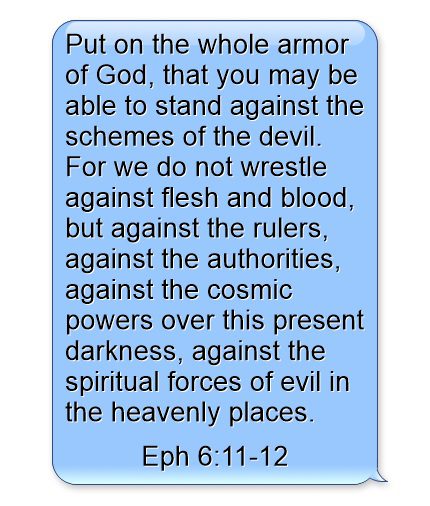Here is a Sunday school lesson or Bible study about the armor of God.
Put it On
Ephesians 6:11-12 “Put on the whole armor of God, that you may be able to stand against the schemes of the devil. For we do not wrestle against flesh and blood, but against the rulers, against the authorities, against the cosmic powers over this present darkness, against the spiritual forces of evil in the heavenly places.”
One of the things about this passage in Ephesians 6 is that twice Paul tells us to “put on the whole armor” and not just part of it. Imagine going into war with part of your armor missing. That’s the first place the enemy will try to attack, “Therefore take up the whole armor of God, that you may be able to withstand in the evil day, and having done all, to stand firm” (Eph 6:13) or make yourself vulnerable by not being fully equipped to enter into enemy territory (Matt 28:19-20).
Can you see your enemy?
Do the rulers and authorities include those in positions of government?
Who is the inspiration behind these attacks?
The Belt and Breastplate
Ephesians 6:14 “Stand therefore, having fastened on the belt of truth, and having put on the breastplate of righteousness.”
The belt of truth means you know the truth and that truth sets you free from your sins and the wrath of God. Latch your belt on this; Jesus said “I am the way, the truth, and the life. No one can come to the Father except through me” (John 14:6) and “there is salvation in no one else, for there is no other name under heaven given among men by which we must be saved” (Acts 4:12). Then the breastplate, protecting the vital organs, is that of Jesus’ own righteousness and here is that breastplate in Scripture; “For our sake he made him to be sin who knew no sin, so that in him we might become the righteousness of God” (2nd Cor 5:21). Don’t miss the point that Paul said we need to “put on the breastplate” just as he had told us twice before to “put on the whole armor of God.”
What other things might you consider as part of the “belt of truth?”
Do you feel you even have a breastplate of righteousness?
Why does Paul say “Stand therefore?”
Standing on the Gospel
Ephesians 6:15 “and, as shoes for your feet, having put on the readiness given by the gospel of peace.”
The “shoes for your feet” might not mean much to us but to Paul it meant a lot because the Roman soldiers had heavy leather shoes that sometimes had spikes in them, much like golf shoes do but only longer. These were meant to stabilize the soldier in rough terrain or while engaged in a battle. The shoes of the gospel is our standing on the promises of God (John 3:16) and being at the ready to give to others the hope that is in us (1st Pet 3:15) and since Paul calls it “the gospel of peace,” he may mean we should not be contentious, argumentative, or debate with someone about why they need to believe in God and in Jesus. Jesus never forced Himself on anyone; He simply said, “Follow Me” (Matt 4:19).
Why do you think Paul calls it the gospel of peace?
Do “shoes” indicate that we are to use our feet and go into our own area of the world with the gospel?
Why does Paul write about “readiness?”
The Shield of Faith
Ephesians 6:16 “In all circumstances take up the shield of faith, with which you can extinguish all the flaming darts of the evil one.”
A shield is only as strong as the matter of which it is composed of but the shield of faith is not a human shield, it is a shield of faith that protects us after being saved by grace, through faith (Eph 2:2-9). This shield is special. It is meant to extinguish the flaming darts from the evil one (Satan) and his demons of darkness. Sometimes, the soldiers would soak their shields in water and so the flaming darts would go out once they struck the shield. We need similar protection because we’re not fight mere flesh.
Why does Paul say it should be “in all circumstances” that we take up our shield?
How can shields extinguish flaming darts?
Why do you think Paul called it “the shield of faith?”
Salvation’s Helmet
Ephesians 6:17 “and take the helmet of salvation, and the sword of the Spirit, which is the word of God.”
The helmet protects the head and the head is where the knowledge of our salvation lives. The helmet can deflect a lot of enemy barbs but then the sword of the Spirit is vital. The sword of the Spirit is the Word of God, the Bible and it’s the only part of the armor that’s offensive in nature. Jesus used the Word of God as a weapon in rebuking the Devil who was taking Scripture out of context. The Word cuts us (Heb 4:12) but it does so in order to heal us. Memorizing Scripture for times of temptation is having taken up “the sword of the Spirit.”
What else does a helmet make you think about in our armor of God?
Do you use the sword of the Spirit only when tempted or as an offensive weapon against non-believers?
What else can the Word of God do for you when you’re tempted or going through a trial?
Conclusion
I urge you in your study to look at all of the Bible verses and read them aloud in the class so that you can get the most out of this lesson on the armor of God. Paul makes the important conclusion for after we’ve put on the armor of God in Ephesians 6:18-19, where he says we’re to be “praying at all times in the Spirit, with all prayer and supplication. To that end keep alert with all perseverance, making supplication for all the saints, and also for me, that words may be given to me in opening my mouth boldly to proclaim the mystery of the gospel” so for Paul, the armor was so that he might boldly “proclaim the mystery of the gospel” and that words would be given to him to do so. That is a great use of the armor of God because as I wrote earlier, the Christian is entering enemy territory and will need every piece of the armor of God there is.
Where do you think Paul was referring to where they’ll need the armor of God?
Why was prayer not part of the armor of God?
What has changed in your understanding about the armor of God after this study?
Article by Jack Wellman
Jack Wellman is Pastor of the Mulvane Brethren Church in Mulvane Kansas. Jack is also the Senior Writer at What Christians Want To Know whose mission is to equip, encourage, and energize Christians and to address questions about the believer’s daily walk with God and the Bible. You can follow Jack on Google Plus or check out his book Teaching Children the Gospel available on Amazon.












